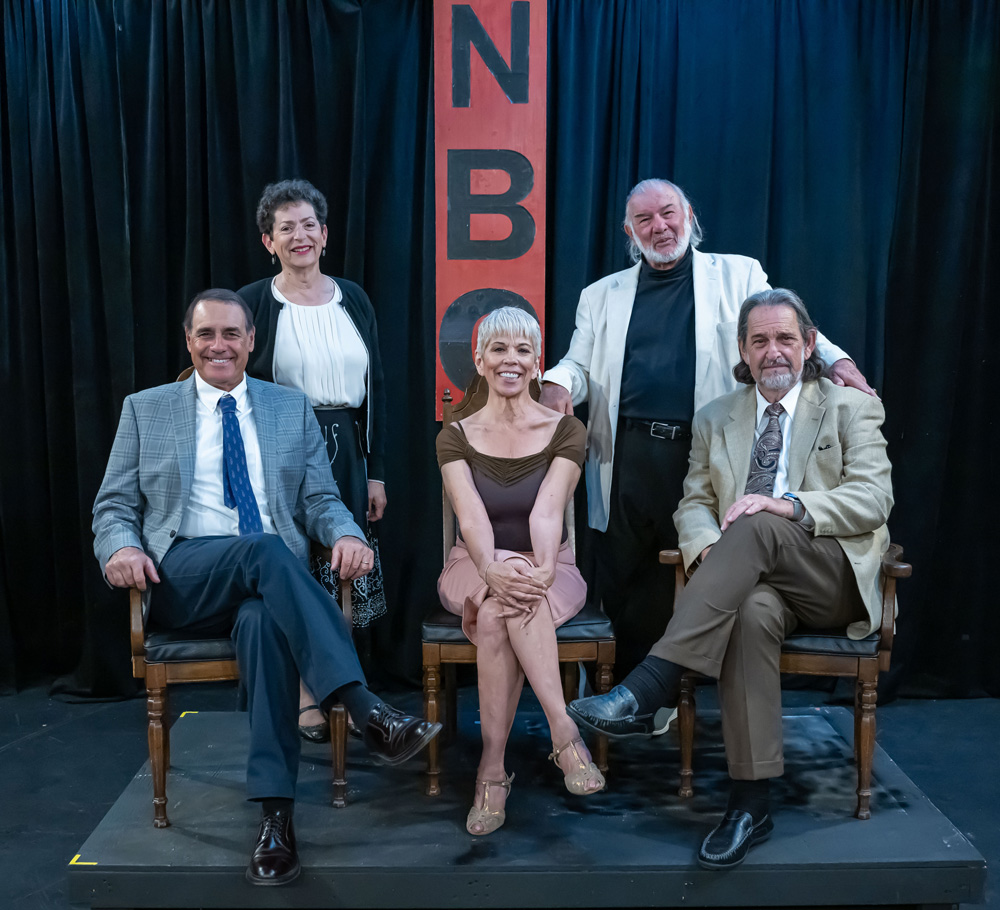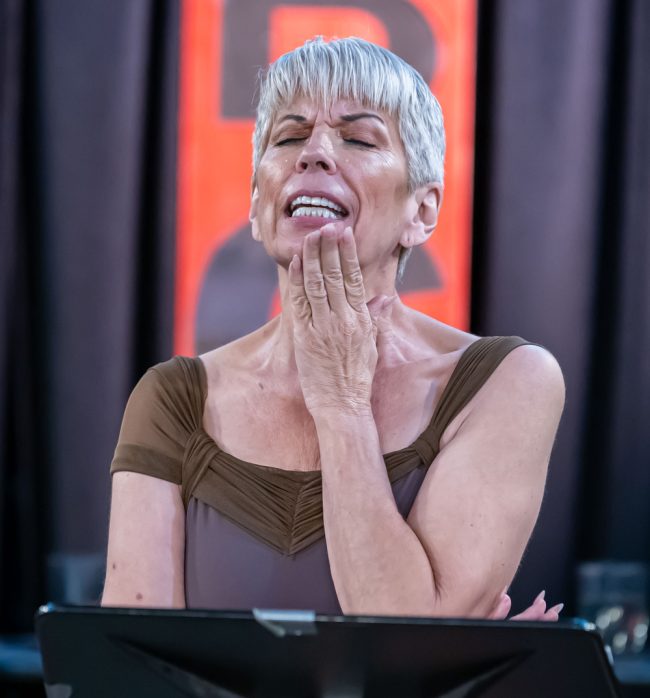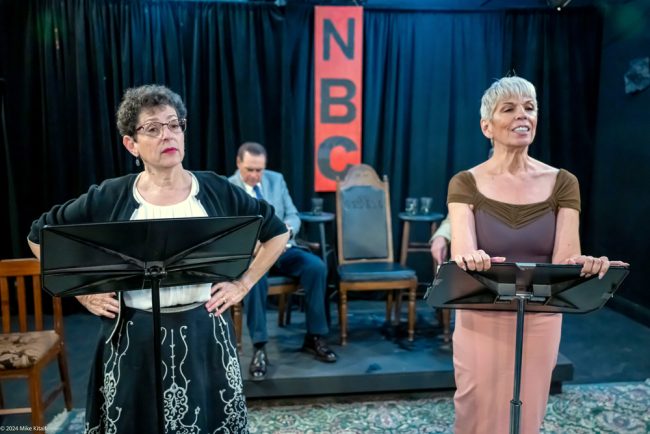
Some 40 years ago, Palm Coast actor-singer-dancer Annie Gaybis was performing her nightclub act at the swanky Holiday Inn Rivermont in Memphis, in the days before she would land roles in such films as the 1984 Tom Hanks comedy “Bachelor Party,” “The Best Little Whorehouse in Texas,” “Twin Peaks: Fire Walk with Me” and Paul Verhoeven’s notorious “Showgirls.”
“It was Christmastime and I had taken the elevator back to my hotel room and I felt very lonely that night,” Gaybis says. “There was no staff there, nobody to order something up. The hotel was very empty. I turned on the television and watched this movie ‘The Country Girl.’ I saw the loneliness in Georgie (the title character) . . . and I just said to myself ‘Wow.’ I didn’t even know it was a play at that time.”
Clifford Odets’s drama won Uta Hagen a Tony Award for Best Actress in a Play when it debuted in 1950, and the work was made into a 1954 film starring Bing Crosby and Grace Kelly, who won the Academy Award for Best Actress. After Gaybis saw the 2008 Broadway revival in New York starring Morgan Freeman, Frances McDormand and Peter Gallagher, she got the yen to perform the title role herself.
That will happen when City Repertory Theatre presents the drama as a radio play – a staged reading – from Thursday Dec. 5 through Sunday Dec. 8 at its black box venue in Palm Coast’s City Marketplace.

Odets’s play tells the story of Frank Elgin, a once-lauded actor who’s become mired in booze even as he’s hoping to return to his past glory, while his ever-faithful wife, Georgie, struggles to keep him from tumbling into an alcoholic abyss.
Hopes rise when theater director Bernie Dodd, a longtime admirer of Frank, offers him, at the last minute, the starring role in a major production after the male lead has bolted. But tensions rise, too, as Dodd suspects Georgie of hindering rather than helping her husband.
Peter Gutierrez, a retired Miami Beach police officer and area theater veteran whose credits include City Rep’s “God of Carnage” and, with Gaybis, Neil Simon’s “Chapter Two,” portrays Frank, who he describes as “vulnerable” even as he admits Frank subjects Georgie to “psychological abuse.”
“Frank was a very famous stage actor and things happened in his life so he started to drink, and his whole world has spiraled down for years and years,” says Gutierrez, a prodigious voice-over artist whose credits include cartoons, radio commercials and the English version of “Every Week Has a Friday,” an Egyptian television mystery that’s playing Netflix in Europe and is coming to the U.S.

“Georgie is his pillar,” Gutierrez adds. “Frank keeps saying ‘You can’t live without me,’ but it’s the other way around. When he was happy and everything was hunky-dory, it was because of her, and after he started drinking, he’s not dead because of her. She’s the one driving the bus.”
City Rep director John Sbordone, who also portrays the narrator and theatrical producer Phil Cook, smiles wryly during the round-table interview of the cast as Gutierrez characterizes Frank as “vulnerable.”
“Frank has that long, wonderful speech in which he says ‘I gotta like the guy I’m playing,’ Sbordone says to Gutierrez. “And that’s what you just did.”
Georgie “tries to be a one-man band” helping Frank with his alcoholism, says Gaybis, who with her husband, comedian-actor John Byner, moved to Flagler County from Los Angeles in 2004. But Odets’s drama reveals the struggles of “trying to solve one person’s addiction no matter how much you love them,” she says.

Jack Rose, who plays Dodd the big-time director, says that “Bernie is in love with art. Early in life he was stung by the theater bee. He was starry-eyed when he saw these amazing actors, and Frank has always been a hero to him.”
Dodd knows that Frank has fallen on hard times, “but he has faith in Frank’s abilities and believes he can coach Frank through this role,” says Rose, who previously performed in professional theater in New York City, and whose local credits include CRT’s “Educating Rita” with Gaybis and the role of Sir Bedevere the Flatulent in Daytona Playhouse’s “Spamalot.”
(That latter role “was typecasting basically,” Rose deadpans.)
Rose believes that the Dodd character “is Odets.” Sbordone concurs.
“The wellspring where Bernie comes from is Odets,” Sbordone says. “Odets is extraordinarily idealistic. He came from the Group Theatre, which was the most idealistic, soaring, art-for-art’s-sake theater of the 1930s.” (The Group Theatre was formed in New York City in 1931 and included actors, directors, playwrights and producers. It dissolved in 1941.)

“What Odets did was incorporate those ideas in the character of Bernie,” Sbordone says. “There’s a wonderful speech that Bernie has about actors: ‘There are actors who know what they want to do from day one and they never grow. They’re in their peanut shell. I want Frank to have free reign.’ That’s because Bernie has seen Frank soar. He’s seen him grab the moment and take it in directions that no one else can. So that’s the idealism behind Bernie and the impetus for even hiring this drunk in the first place.”
Gutierrez admits he himself yearns for the free reign that Bernie envisions for Frank.
“The character of Frank is an actor’s dream,” Gutierrez says. “I don’t like flat characters. I’ve done it and I’ll do it again I’m pretty sure, but I don’t like flat characters and this guy is definitely not flat – he’s all over the place. I feel sorry for John because he’s got to reign me in – if not I just go freakin’ crazy.”
As for Georgie, should audiences be leery that Odets created his female lead decades before the women’s rights movement that flourished in the 1960s and ’70s, and more than a half-century before the #MeToo Movement?
Julia Truilo, who portrays playwright Paula Unger, says Georgie “is not a victim. She’s very much her own person. She loves Frank. It’s an argument you can make whether she should or shouldn’t, but she does love him and she stands up for him.”
“I think everyone will relate to Georgie,” Gaybis says.
As with any staged reading – this one in the guise of a radio play – the City Rep performers will be using scripts that are readily visible to the audience.
While Sbordone has cast this production as an old-time radio play, Truilo likens it to “a podcast.” Gutierrez, coming from his background as a voice-over artist, says the effect will be akin to listening to an audio book.
“The tradition of storytelling is as old as man,” Sbordone says. “My first degrees were in literature and I came to the theater through what we used to call oral interpretation and readers’ theater. We thought it was the most marvelous thing around because you could take any form of literature and convert it to performance. So I’m growing up in the ’60s and early ’70s and New York was loaded with this kind of entertainment. In fact, Paul Sills’ Story Theatre was on Broadway. There is a whole series of very fine performances that come from this tradition.
“I love that comparison to a podcast. It’s very much part of the whole spectrum of what performance is. You can take a short story, you can take anything and convert it into performance. Even though you’re not moving around, you still have to act. You can hold an audience – they will see everything while not seeing a thing. It’s magic.”
–Rick de Yampert for FlaglerLive
![]()
City Repertory Theatre will stage “The Country Girl” at 7:30 p.m. Thursday Dec. 5, Friday Dec. 6 and Saturday Dec. 7, and at 3 p.m. Sunday Dec. 8. Performances will be in CRT’s black box theater at City Marketplace, 160 Cypress Point Parkway, Suite B207, Palm Coast. Tickets are $25 adults and $15 students, available online at crtpalmcoast.com or by calling 386-585-9415. Tickets also will be available at the venue just before curtain time.





























Leave a Reply